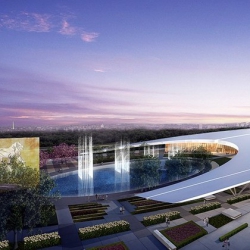
Jim Murren would like to place an integrated casino-resort in Georgia similar to the MGM National Harbor in Maryland.
Georgia lawmakers plan to re-introduce a casino bill in the state legislature next week. The latest iteration of the bill is expected to focus on few casinos, while emphasizing that the decision will be left to voters.
It is thought that the 2016 casino gambling bill was too ambitious, calling for a massive expansion of gambling in the conservative-leaning states. Last year, up to six casinos were proposed. This year, the proposal is likely to involve 2 casinos. The 2016 bill never came to a vote.
Better Chance of Success in 2017
But Rep. Ron Stephens, a Republican from Savannah who co-sponsored both bills, said that the chances are better for success this year. In fact, Rep. Stephens predicted that Georgia is about to become on the biggest hotspots in the world for casino developers, because the prospects are so good for passage of a casino bill.
Stephens told 11 Alive NBC News Georgia, “If you have a casino in the world, all eyes are focused on Georgia right now. It is the plum.”
Georgia Casino Tax Rates
The taxes on the new casinos likely are going to be set at 20% of gross revenues. Those taxes are expected to contribute to the HOPE Scholarship Fund, which is in need of funding in the state of Georgia. An additional needs-based college scholarship fund is also likely to be added to the bill.
The 2017 casino bill is expected to approve gambling for counties or regions which choose to have gambling, much like the 2011 alcohol bill sent the decisions back to the county-level voters.
Revenues for the HOPE Scholarship Fund
Proponents plan to stress that the voters will have the ability to vote on the proposals in a statewide referendum. That is meant to secure the support of wavering lawmakers, who do not want to have to defend a vote which forces casino gambling on their constituencies.
Lt. Gov. Cagle on Casino Bill
Lt. Gov. Casey Cagle said the casino bill is not a hot topic at the moment. In fact, the second-ranking official in the state seemed to predict that the casino bill would fare no better in 2017 than it did in 2016.
During an interview on a wide range of topics, Lt. Gov. Cagle stated, “I would say that right now it doesn’t have a lot of momentum.”
Ron Stephens Is Optimistic
Ron Stephens disagrees. After 18 months when the national debate on foreign policy and the culture wars dominated politics, he thinks the focus is going to return to local issues soon. He added, “I predict this year we’re probably going to have a vote.”
With the focus on the 2016 US Presidential Election and its consequences, not much attention has been paid by local officials, lawmakers, or voters to building brick-and-mortar casinos in Georgia. As the 2017 legislative season opens, lawmakers secure that they won’t face a vote for 22 months or more can focus on policies which would help the people of Georgia. Eventually, the focus goes back to state and local politics.
MGM Resorts and Las Vegas Sands
American casino companies have been putting stock on Georgia casinos for over a year now. MGM Resorts’ CEO Jim Murren was reported to be in Atlanta and Athens looking at potential casino sites as early as 2015. Las Vegas Sands’ CEO Sheldon Adelson pulled his lobbyists out of Florida in 2015, and at the same time poured resources into the Georgia lobbying effort. Both casino executives have indicated they would like to receive the Atlanta casino license, if such a plum development were approved.
Both companies are certain to spend a lot of money lobbying in Georgia in 2017. With the kind of cash men like Sheldon Adelson can spend, proponents of a casino bill should have a voice in the state. Georgia’s citizens tend to be socially conservative, though, so Ron Stephens’ proposal is likely to face stiff resistance. At the moment, Georgia only allows casino cruises. Such cruises skirt Georgia gaming laws, because the casinos navigate beyond the 3-mile international waters barrier, where state gaming laws no longer apply.
